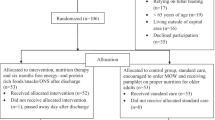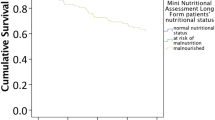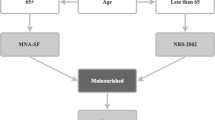Abstract
Objective:
We investigated the nutritional, cognitive and functional status in residents of two service-flat (SF) complexes and the effects of a nutrition education programme for care staff.
Design:
Controlled nonrandomised study.
Setting:
Two SF complexes, that is community-assisted accommodation.
Subjects:
Of 115 eligible SF residents, 80 subjects participated (age 83±7 y, 70% women).
Intervention:
The nutritional status was assessed using body mass index (BMI, kg/m2), subjective global assessment (SGA), serum concentrations of albumin, insulin-like growth factor-I (IGF-I) and vitamin B12. Cognitive and functional status were evaluated using the Mini Mental State Examination (MMSE, 0–30 points, <24 points indicates impaired cognition) and the Katz activities of daily living (ADL) index, respectively. Two assessments were made with a 5-month interval. At the start, a 12-h education programme was given to the staff at one of the SF complexes.
Results:
At baseline, the means of BMI and the biochemical nutritional indices were normal, whereas one-third had BMI <22 kg/m2 and one-fourth had lost ≥10% of previous weight. According to SGA, 30% demonstrated possible or serious malnutrition. The median MMSE was 23 points (19.5–26.5, 25–75th percentile). Nearly 70% were ADL-independent. At the 5-month follow-up there were no differences in the nutritional and cognitive status of the residents. The nutritional knowledge of the staff improved slightly (P<0.05) at both SF complexes (NS between groups).
Conclusions:
Around one-third of SF residents appeared to be at nutritional risk. Five months after a 12-h staff nutrition education programme, no objective changes were seen in the nutritional status of the SF residents.
Sponsorship:
Supported by grants from the Swedish National Board of Health and Welfare and by the Swedish Research Council.
This is a preview of subscription content, access via your institution
Access options
Subscribe to this journal
Receive 12 print issues and online access
$259.00 per year
only $21.58 per issue
Buy this article
- Purchase on Springer Link
- Instant access to full article PDF
Prices may be subject to local taxes which are calculated during checkout
Similar content being viewed by others
References
Akner G & Cederholm T (2001): Treatment of protein-energy malnutrition in chronic nonmalignant disorders. Am. J. Clin. Nutr. 74, 6–24.
Beck AM & Ovesen L (1998): At which body mass index and degree of weight loss should hospitalized elderly patients be considered at nutritional risk? Clin. Nutr. 17, 195–198.
Cederholm T & Hellström K (1992): Nutritional status in recently hospitalized and freeliving elderly subjects. Gerontology 38, 105–110.
Cederholm T, Jägrén C & Hellström K (1993): Nutritional status and performance capacity in internal medical patients. Clin. Nutr. 12, 8–14.
Cederholm T, Jägrén C & Hellström K (1995): Outcome of protein-energy malnutrition in elderly medical patients. Am. J. Med. 98, 67–74.
Chandra RK (2002): Nutrition and the immune system from birth to old age. Eur. J. Clin. Nutr. 56 (Suppl 3), S73–S76.
Christensson L, Unosson M & Ek A-C (2002): Evaluation of nutritional assessment techniques in elderly people newly admitted to municipal care. Eur. J. Clin. Nutr. 56, 810–818.
Chilima DM & Ismail SJ (2001): Nutrition and handgrip strength of older adults in rural Malawi. Public Health Nutr. 4, 11–17.
Detsky AS, McLaughlin JR, Baker JP, Johnston N, Whittaker S, Mendelson RA & Jeejeebhoy KN (1987): What is subjective global assessment of nutritional status? J. Parenteral Enteral Nutr. 11, 8–13.
Dorn J, Schisterman E F, Winkelstein W & Trevisan M (1997): Body mass index and mortality in a general population sample of men and women. The Buffalo Health Study. Am. J. Epidemiol 146, 919–931.
Duerksen DR, Yeo TA, Siemens JL & O’Connor MP (2000): The validity and reproducibility of clinical assessment of nutritional status in the elderly. Nutrition 16, 740–744.
Ek AC, Unosson M, Larsson J, Ganowiak W & Bjurulf P (1996): Interrater variability and validity in subjective nutritional assessment of elderly patients. Scand. J. Caring Sci. 10, 163–168.
Faxén-Irving G, Andrén-Olsson B & Cederholm T (1999): Nutritional and cognitive status in elderly subjects living in service flats and the effect of nutrition education on personnel. Gerontology 45, 187–194.
Faxén-Irving G, Andrén-Olsson B, Geijerstam A, Basun H & Cederholm T (2002): The effect of nutritional intervention in elderly subjects residing in group-living for the demented. Eur. J. Clin. Nutr. 56, 221–227.
Fleck A (1988): Acute phase response: implications for nutrition and recovery. Nutrition 4, 109–117.
Flodin L, Svensson S & Cederholm T (2000): Body mass index as a predictor of 1-year mortality in geriatric patients. Clin. Nutr. 19, 121–125.
Folstein MF, Folstein SE & McHugh PR (1975): ‘Mini Mental State’. A practical method for grading the cognitive state of patients for the clinician. J. Psychiatry Res. 12, 189–198.
Hilding A, Hall K, Wivall-Hilleryd IL, Sääf M, Melin A-L & Thorén M (1999): Serum levels of insulin-like growth factor 1 (IGF-1) in 152 patients with growth hormone (GH) deficiency aged 19–82 years in relation to healthy subjects. J. Clin. Endochrinol. Metab. 84, 2013–2019.
Humphreys J, de la Maza P, Hirsch S, Barrera G, Gattas V & Bunout D (2002): Muscle strength as a predictor of loss of functional status in hospitalized patients. Nutrition 18, 616–620.
Katz S, Ford AB, Moskowitz RW, Jackson BA & Jaffe MW (1963): Studies of illness in the aged. The index of ADL: a standardized measure of biological and psychological function. JAMA 185, 94–99.
Kertzman S, Aladjem Z, Milo R, Ben-Nahum Z, Birger M, Grinspan H, Weizman A & Kotler M (2004): The utility of the Visual Analogue Scale for the assessment of depressive mood in cognitively impaired patients. Int. J. Geriatr. Psychiatry 19, 789–796.
Larsson J, Andersson M, Askelöf N & Bark T (1994): Undernäring vanligt vid svenska sjukhus (in Swedish, abstract in English). Läkartidningen 91, 2410–2413.
McWhirter JP & Pennington CR (1994): Incidence and recognition of malnutrition in hospital. Br. Med. J. 308, 945–948.
Minuto F, Barreca A, Adami GF, Fortini P, Del Monte P, Cella F, Scopinaro N & Giordano G (1989): Insulin-like Growth Factor-1 in human malnutrition: Relationship with some body composition and nutritional parameters. J. Parenteral Enteral Nutr. 13, 392–396.
Parker BA, Sturm K, MacIntosh CG, Feinle C, Horowitz M & Chapman IM (2004): Relation between food intake and visual analogue scale ratings of appetite and other sensations in healthy older and young subjects. Eur. J. Clin. Nutr. 58, 212–218.
Pennington CR (1998): Disease-associated malnutrition in the year 2000. Postgrad Med. J. 74, 65–71.
Perry L (1997): Nutrition: a hard nut to crack. An exploration of the knowledge, attitudes and activities of qualified nurses in relation to nutritional nursing care. J. Clin. Nurs. 6, 315–324.
Persson M, Brismar K, Katzarski K, Nordenström J & Cederholm T (2002): Nutritional status using mini nutritional assessment and subjective global assessment predict mortality in geriatric patients. J. Am. Geriatr. Soc. 50, 1996–2002.
Pieterse S, Manandhar M & Ismail S (2002): The association between nutritional status and handgrip strength in older Rwandan refugees. Eur. J. Clin. Nutr. 56, 933–939.
Rivière S, Gillette-Guyonnet S, Voisin T, Reynish E, Andrieu S, Lauque S, Salva A, Frisoni G, Nourhashemi F, Micas M & Vellas B (2001): A nutritional education program could prevent weight loss and slow cognitive decline in Alzheimer's disease. J. Nutr. Health Aging 5, 295–299.
Sacks GS, Dearman K, Replogle WH, Cora WL, Meeks M & Canade T (2000): Use of subjective global assessment to identify nutrition-associated complications and death in geriatric long-term care facility residents. J. Am. Coll. Nutr. 19, 570–577.
Sahyoun NR, Pratt CA & Anderson A (2004): Evaluation of nutrition education interventions for older adults. A proposed framework. J. Am. Diet Assoc. 104, 58–69.
Saletti A, Lindgren E, Johansson L & Cederholm T (2000): Nutritional status according to Mini Nutritional Assessment in an institutionalized elderly population in Sweden. Gerontology 46, 139–145.
Sidenvall B (1997): Altered values concerning meals procedures among caregivers in elderly care. Health Care in Later Life 2, 187–196.
Skoog I, Nilsson L, Palmertz B, Andreasson LA & Svanborg A (1993): A population-based study of dementia in 85-year-olds. N. Eng. J. Med. 328, 153–158.
Thorslund S, Toss G, Nilsson I, Schenk H, Symreng T & Zetterqvist H (1990): Prevalence of proteinenergy malnutrition in a large population of elderly people at home. Scand J. Prim. Health Care 8, 243–248.
Ulander K, Grahn G & Jeppsson B (1993): Subjective assessment of nutritional status—validity and reliability of a modified Detsky index in a Swedish setting. Clin. Nutr. 12, 15–19.
Unosson M, Ek A-C, Bjurulf P & Bjurulf P (1991): Demographical, sociomedical and physical characteristics in relation to malnutrition in geriatric patients. J. Adv.. Nurs. 16, 1406–1412.
Vellas B, Guigoz Y, Baumgartner M, Garry PJ, Lauque S & Albarede JL (2000): Relationships between nutritional markers and the mini-nutritional assessment in 155 older persons. J. Am. Geriatr. Soc. 48, 1300–1309.
Acknowledgements
This work was supported by grants from the Stockholm South-West Health Care Region, from the Swedish National Board of Health and Welfare and from the Swedish Research Council. The work was carried out in co-operation with the Brännkyrka District Council. We thank Mrs Eyra Granström, Mr Göran Henriksson, Mrs Maj-Lis Styrwolt, Mrs Marianne Popovski, Mrs Eeva Eriksson and Mrs Sonia Mattsson for their committed involvement in the study.
Author information
Authors and Affiliations
Corresponding author
Additional information
Guarantor: T Cederholm.
Contributors: All authors have been engaged in the planning of the study. GF-I, BA-O and AG performed the examinations at the SF complexes. GF-I, BA-O, AG and TC were engaged in the education programme. GF-I performed the data analysis. GF-I, TC and HB completed the analyses, and took part in the writing process and final compilation of the manuscript.
Rights and permissions
About this article
Cite this article
Faxén-Irving, G., Andrén-Olsson, B., Geijerstam, A. et al. Nutrition education for care staff and possible effects on nutritional status in residents of sheltered accomodation. Eur J Clin Nutr 59, 947–954 (2005). https://doi.org/10.1038/sj.ejcn.1602163
Received:
Revised:
Accepted:
Published:
Issue Date:
DOI: https://doi.org/10.1038/sj.ejcn.1602163
Keywords
This article is cited by
-
Strategies to implement community guidelines on nutrition and their long-term clinical effects in nursing home residents
The Journal of nutrition, health and aging (2015)
-
Nutritional guidance improves nutrient intake and quality of life, and may prevent falls in aged persons with Alzheimer disease living with a spouse (NuAD trial)
The Journal of nutrition, health and aging (2015)
-
Maintaining nutrition in aged care residents with a train-the-trainer intervention and nutrition coordinator
The Journal of nutrition, health and aging (2009)
-
Health and nutritional promotion program for patients with dementia (nutrialz study): Design and baseline data
The Journal of nutrition, health and aging (2009)
-
The effects of nutrition education on professionals' practice and on the nutrition of aged residents in dementia wards
European Journal of Clinical Nutrition (2007)



